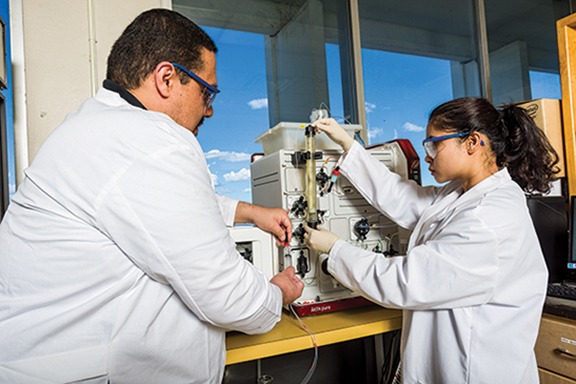Alberto Rascon
Inhibiting Mosquito Egg Production
We may consider mosquitos a simple nuisance, but these tiny insects are responsible for the transmission of the Zika, Dengue, Yellow Fever, and Chikungunya viruses. Alberto Rascón and his student researchers are determined to limit the mosquito population, and in turn, minimize the viruses spread.
Rascón’s team focuses on digestive enzymes known as proteases. Feeding on an (infected) human host provides the mosquito with proteins needed for reproduction. Proteases break down those proteins into peptides needed for egg laying. The team’s goal is to inhibit the protease’s process to limit egg production, thereby minimizing the mosquito population, and in turn minimizing virus transmission
During his five and a half years at SJSU, more than 20 of Rascón’s undergraduate students have gone on to optometry, dental, pharmacy, and medical schools, as well as to Ph.D. programs. He credits them with his lab’s success.
“Without my students, our research lab would not be as successful in securing federal funding. Their work has led to submissions of manuscripts for publication and presentations at local and national conferences (both orally or poster), giving them the confidence to discuss science with peers and with science faculty from other universities.”

Research Assistant Saira Montermoso works with Alberto Rascón to install a 50-mL superloop into the AKTA Fast Protein Liquid Chromatography protein purification system. Saira graduated in 2017 with a double major in Chemistry (concentration in Biochemistry) and Computer Science. She has been working in Dr. Rascón’s lab since 2016. Saira will start work on her Ph.D. at the University of Pennsylvania this summer.
Chemistry, College of Science
Sponsor: National Institutes of Health
SJSU Research Foundation 2019 Annual Report